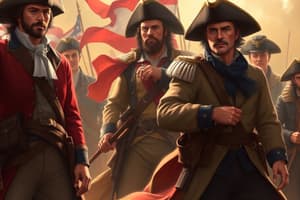Podcast
Questions and Answers
Which battle is considered the turning point of the American Revolution?
Which battle is considered the turning point of the American Revolution?
- Battle of Savannah
- Battle of Saratoga (correct)
- Battle of Cowpens
- Battle of Yorktown
What motivated Benedict Arnold to betray the Americans?
What motivated Benedict Arnold to betray the Americans?
- Financial gain from the British
- Personal vendetta against George Washington
- Desire for military power
- Lack of recognition for his efforts (correct)
Who was the French Admiral that won a key victory in the Chesapeake?
Who was the French Admiral that won a key victory in the Chesapeake?
- Jean Bart
- Charles de Barras
- Count de Rochambeau
- Count de Grasse (correct)
Which event resulted in the Americans surrendering their largest army during the war?
Which event resulted in the Americans surrendering their largest army during the war?
What aspect of foreign support significantly contributed to America's victory?
What aspect of foreign support significantly contributed to America's victory?
What best describes the role of a Privateer during the American Revolution?
What best describes the role of a Privateer during the American Revolution?
Which battle is noted as the first major military confrontation of the American Revolution?
Which battle is noted as the first major military confrontation of the American Revolution?
What was the primary result of the Battle of Trenton?
What was the primary result of the Battle of Trenton?
What leadership quality did George Washington exemplify during the harsh winter at Valley Forge?
What leadership quality did George Washington exemplify during the harsh winter at Valley Forge?
What can be inferred about the term 'Sunshine Patriots'?
What can be inferred about the term 'Sunshine Patriots'?
Flashcards are hidden until you start studying
Study Notes
Key Figures and Events
- Vincennes: A pivotal battle in the American Revolution where American forces under George Rogers Clark captured the British-held fort, securing control of the Northwest Territory.
- Treaty of Ally and Commerce and Treaty of Allance: These treaties solidified the alliance between France and the United States, providing crucial military and financial support to the American cause.
- Major John Andre: A British officer involved in Benedict Arnold's treasonous plot to hand over West Point to the British.
- Count Casimir Pulaski: A Polish nobleman who served as a general in the Continental Army. He was killed fighting in the Battle of Savannah.
- Count de Grasse: A French admiral who played a key role in the victory at Yorktown, blocking British reinforcements by sea.
- Nathanael Greene: A brilliant American general who adopted a strategy of attrition, wearing down the British army through a series of maneuvers and engagements.
- Benedict Arnold: A talented American general who turned traitor, plotting to surrender West Point to the British. His actions stemmed from a combination of personal grievances, desire for recognition, and potential financial gain.
- British Brigadier General Benedict Arnold: This identifies Arnold as a traitorous military figure serving the British cause after his betrayal.
- Count de Rochambeau: A French general who commanded the French expeditionary force sent to assist the Americans. He played a key role in the victory at Yorktown.
- John Paul Jones: A famed American naval captain who achieved victory in several significant engagements and gained recognition for his bold tactics.
- Unexpected circumstance that helped America win the war with England: The timing of the war coincided with a period when Great Britain was also involved in other conflicts, spreading its resources thin and diverting attention away from the Americas.
- Charleston: A key city in South Carolina where a significant battle took place leading to a major American defeat, causing the loss of a large portion of the Continental Army.
- Battle of Yorktown: The decisive battle of the American Revolution leading to the surrender of British forces under Cornwallis.
- Map of Princeton: This likely refers to a map depicting the Battle of Princeton, highlighting troop movements, and highlighting the significance of this pivotal battle.
- Treaty of Paris: The peace treaty formally ending the American Revolution, officially recognizing the independence of the United States of America.
- Ambush: A key tactic used by Americans such as Daniel Morgan to capitalize on their knowledge of terrain and surprise British forces.
- Daniel Morgan: A skilled American general known for his mastery of ambushes and guerilla warfare resulting in crucial victories.
Summary of Events
- Battle that served as the turning point: The Battle of Saratoga was a decisive victory for the Americans, convincing France to officially enter the war on their side.
- French support: France's support provided crucial military and financial aid, bolstering the Americans' ability to fight the British.
- An important victory in the west: George Rogers Clark's victory at Vincennes helped secure control over the crucial Northwest Territory, hindering British efforts towards the south.
- Treaty with France: The Treaty of Alliance solidified the partnership between France and the United States, providing vital support for the American cause.
- Benedict Arnold's betrayal: Arnold's treachery, attempting to surrender West Point to the British, shocked the American forces and highlighted the internal struggles within the Continental Army.
- Inspiring the ideals: The American Revolution inspired other aristocrats around the world, as they witnessed the potential for democratic ideals to challenge established power structures.
- Battle of Savannah: The battle witnessed the death of Count Casimir Pulaski, a Polish aristocrat who had dedicated his life to fight for American independence.
- French Admiral Victory: The French admiral, Count de Grasse, achieved a crucial naval victory in Chesapeake, effectively trapping the British army at Yorktown.
- American General Strategies: Generals like Nathanael Greene employed strategies that weakened British forces through attrition, forcing them to fight on unfamiliar terrain while disrupting their supply lines.
- Benedict Arnold's motivations: Arnold's motivations for betrayal are often attributed to a combination of personal grievances, yearning for recognition, and potential financial gain, all of which fueled his desire to switch sides.
- Great General for America: General Horatio Gates, known for his victory at Saratoga, believed that victory at Saratoga would significantly alter the course of the war. He skillfully deployed his forces to achieve this crucial win.
- Failed to control Troops: The French general Rochambeau struggled to contain the behavior of his troops during the war, leading to incidents where prisoners were killed and a town was destroyed.
- Naval Commander: John Paul Jones, a prominent American naval commander, famously stated "I have not yet begun to fight!" before his ship, the Bonhomme Richard, was sunk by the British forces.
- England ends War: Great Britain's war with the United States coincided with other conflicts they were involved in, further straining their resources and contributing to their eventual defeat.
- American's Worst Defeat: The American's suffered a severe defeat in Charleston, South Carolina, losing 5,000 soldiers to British capture, representing their heaviest loss of the war.
- Victory for Americans: The victory at Yorktown marked a turning point in the war, leading to the eventual recognition of American independence from Britain.
- General Cornwallis Surrender: General Cornwallis, a prominent British leader, was forced to surrender alongside his army to the American forces at Yorktown, signifying a decisive defeat for the British cause.
- Helpful Item to Washington: A captured British officer provided General Washington with critical information on troop movements, cannons, and other resources on an unguarded road at Princeton. This information helped Washington strategize his next move.
- Peace Plan: The peace plan adopted by Congress included key provisions such as the evacuation of all British troops, the establishment of the Mississippi River as the western boundary, and comprehensive recognition of American independence.
- American General Surprise Attack: General Daniel Morgan captured Quebec and achieved a significant victory against General Tarleton at the Battle of Cowpens, highlighting his strategic brilliance and boldness.
- Primary Source: A primary source refers to a firsthand account of the events during the American Revolution, providing contemporary perspectives on the war. These accounts are invaluable for understanding the war from the perspectives of those who lived through it.
Studying That Suits You
Use AI to generate personalized quizzes and flashcards to suit your learning preferences.




